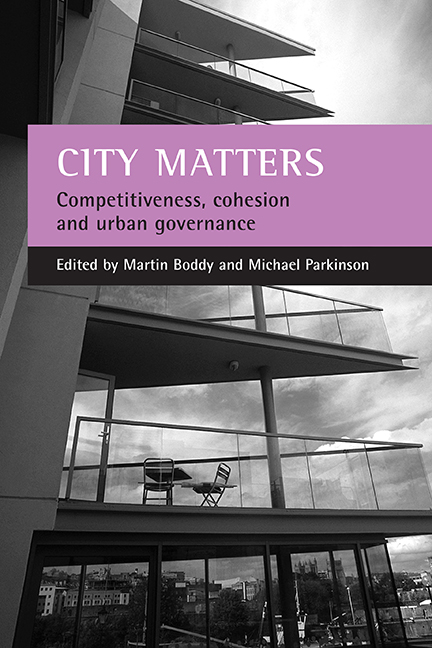Book contents
- Frontmatter
- Contents
- List of tables and figures
- Foreword
- Acknowledgements
- Notes on contributors
- one Introduction
- Part One Competitiveness, cohesion and urban governance
- Part Two Competitiveness and urban change
- Part Three Competitiveness, innovation and the knowledge economy
- Part Four Housing, property and economic performance
- Part Five Space, place and social cohesion
- Part Six Ethnicity, enterprise and social cohesion
- Part Seven Leadership, governance and social capital
- Conclusions
- Index
twenty one - Voluntary organisations and the generation of social capital in city politics
Published online by Cambridge University Press: 20 January 2022
- Frontmatter
- Contents
- List of tables and figures
- Foreword
- Acknowledgements
- Notes on contributors
- one Introduction
- Part One Competitiveness, cohesion and urban governance
- Part Two Competitiveness and urban change
- Part Three Competitiveness, innovation and the knowledge economy
- Part Four Housing, property and economic performance
- Part Five Space, place and social cohesion
- Part Six Ethnicity, enterprise and social cohesion
- Part Seven Leadership, governance and social capital
- Conclusions
- Index
Summary
There is considerable common ground between debates around social cohesion on the one hand and somewhat more specific ideas of social capital (Boddy, 2002). This is particularly the case where social cohesion is seen in terms of participation in different forms of social relations or associational activities. The debate around social capital directs attention in particular to oft-neglected features of the civic infrastructure of cities and promises an explanation of why in some localities political activity (and more broadly social and economic activity) displays greater vitality and appears to be more effective. Research on social capital has been dominated by the work and approach of Robert Putnam (1993, 2000). In much of his early work, Putnam laid a great emphasis on the number and density of voluntary organisations in an area as a good predictor of the presence or absence of social capital. ‘The more voluntary organisations the better’ was the broad message. As levels of social capital increase, then this is said to have a significant positive impact on important policy outcomes in areas such as education, health, crime, welfare, economic growth, the performance of political institutions and the development of effective and democratic governance.
In the light of such claims, it is not surprising that “in a little over a decade the topic of social capital has moved from the pages of obscure journals to the forefront of policy debate” (Leigh and Putnam, 2002, p 15). Yet we are not convinced that the creation of social capital can have a beneficial public effect in as straightforward a manner as some policy makers and advocates would have us believe. Social capital does or fails to do its work in particular contexts and whether it does so depends on a variety of factors other than the levels and intensity of social capital. Putnam deserves considerable credit in bringing the concept of social capital to the attention of social scientists and policy makers. His own work is impressively constructed and executed but we believe that Putnam’s approach is limited on a number of counts.
First, particularly in his early work Putnam takes a ‘bottom-up perspective’: he focuses on the affect of the attitudes and behaviour of individuals on the performance of social and political institutions.
- Type
- Chapter
- Information
- City MattersCompetitiveness, Cohesion and Urban Governance, pp. 389 - 404Publisher: Bristol University PressPrint publication year: 2004
- 1
- Cited by

